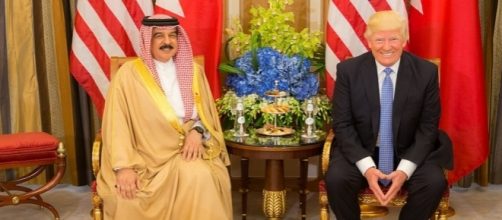On Sunday, President Trump urged #Muslim Leaders from around the world to reject #religious extremism, and to challenge the pernicious idea that religions need to be in conflict with each other. He also assured those Muslim leaders that they should not violate their citizen's human rights.
Trying out a different tone from his regular anti-Muslim rhetoric – he did after all propose a #ban on Muslims entering the United States and once claimed that "Islam hates us" – Trump also declared terrorism to be a “battle between Good And Evil" that should be fought by decent people of all religious persuasions.
“This is not a battle between #different faiths, different sects or different civilizations,” the president said. “This is a battle between barbaric criminals who seek to obliterate human life and decent people, all in the name of religion. People want to protect life and want to protect their religion. This is a battle between good and evil.”
Back home, a conflict brews
The second day of the President's trip came at a warring time for his administration back in Washington DC, and his address was crafted to be the main focus of his stop in Riyadh, where he took meetings with Arab and #Muslim leaders. As the press and both political parties back home debated whether Trump should be impeached and whether he was a sound candidate for the job at hand, in #Riyadh he crafted out a more subtle take on his views of Islam and the Muslim majority countries; this, in contrast to the earlier days of his presidency.
In the past, Trump has lashed out at leaders such as #President Barack Obama for not avoiding the phrase “radical Islamic terrorism,” and in Riyadh his aides were wanting him to avoid the term in his speech with the Muslim countries as his audience. Trump, signaling a subtler take on the Muslim issue creation by his administration, was supposed to use the term “Islamist extremism.” According to some experts on Islam extremism, the word ' Islamist' implies extremism without tarnishing the whole Muslim religion. However when the time came in his speech to use a more carefully crafted language, the president went off script and said both words – #Islamist and #Islamic.
President Trump described facing "the crisis of Islamic extremism and the Islamists and Islamic terror of all kinds." Aides weren’t sure if he had meant to confuse the terms or whether he had consciously rejected the text.
Media commentators in outlets such as the New York Times claimed that Trump is hoping to place more of a burden on #Muslim leaders, by asking them to encounter and challenge the Islamist extremism in their countries. He described the countries in the Middle East as running out of time if they are simply going to sit and wait for the United States to destroy this enemy for them. These countries, he emphasized, need to decide what sort of future they want "for themselves, for their countries and, frankly, for their families and for their children.”
Foot soldiers of evil
Trump claims that it is up to #Muslims throughout the world to purge their communities and societies of these "foot soldiers of evil,” as he called them.
“Drive them out,” he said. “Drive them out of your places of worship. Drive them out of your communities. Drive them out of your holy land. And drive them out of this earth.”
He continued his speech saying that the United States will make diplomatic and military decisions based on logic and real world issues, not what he described as inflexible ideology. The United States will also, he added, go after more gradual reforms and not harsh and sudden interventions. This yet again signaled his willingness to tamper down his harshness in regards to Muslim countries.

